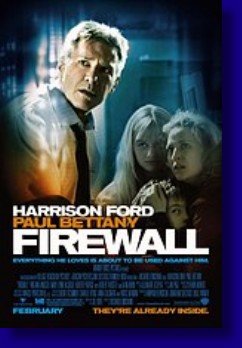

Reviewed by
Bud Carlson

“Firewall” wants to be the next-generation in “great bank heist” movies; instead of trying to get into the bank after hours and breaking into the safe to steal bricks of $100 bills, the criminals are breaking into the bank’s computers and wire-transferring the loot to their offshore accounts. But once you get past this one twist, the story is very much the standard fare of “an American family under siege and in peril”. And it’s not a particularly compelling version at that. There’s too much talking and thinking for this movie to be an action movie, and there just aren’t enough credible thrills for it to be a good thriller either.
The movie opens with Cape Fear-esque
scenes where someone is doing surveillance on Jack Stanfield (played by
Harrison Ford) and his family. In fact, it is pretty clear from these
opening sequences that they have gotten pretty close to Jack, and
pretty familiar with his family. From the surveillance, you can see
that Jack is doing all right for himself, with a beautiful house on the
Seattle oceanfront, an outstanding 35-foot hatteras,
and a more-than-respectable Chrysler 300. Oh yeah, plus a good-looking
wife (Virginia Madsen, most notably from Sideways), and two teenage
kids. It’s a pretty cool way to introduce you to the characters,
all the while giving you the sense that something bad is going to
happen to them. Unfortunately, these opening scenes are probably the most interesting of the show.
The plot develops as we quickly learn that Jack is a computer security specialist who works for Landrock-Pacific
Bank. He’s a top-ranking executive at the bank, having built his
reputation on designing the industry’s most fraud-proof
hack-proof computer banking systems. But alas, this creates a big
pitfall for the movie: how much technology does the filmmaker want to
expose the audience to? In the standard bank-heist movies, we all
pretty much understand that there’s some sort of security system
for the bank building itself, and then there’s a safe that must
be defeated. (Just picture all those classic scenes in various movies
over the years where the safe-cracker is spinning the dial listening
for the tumblers to line up.) We’ve come to accept and expect
that this is what breaking into a bank is all about.
But not for Firewall, where the physical cash in the vault is nothing more than an afterthought, where the target is the network of computers that hold the real wealth of the bank. So the filmmaker had to make a choice with this movie: he could either expose us to all of the technical aspects of the bank’s systems so



that we can better understand the challenges of this next-generation bank-heist, or he could dumb it down and just convince us that Jack knows what he’s doing (without further explanation for us). This film chose the latter, which I think was very unfortunate for the credibility of the movie. In fact, in one of the most ridiculous scenes of the movie, one of Jack’s subordinates is sitting at his cubicle trying to fend off a hacker who is trying to break into the bank’s website. Jack comes over and sits down at the keyboard, utters some jargon about “ISP masks” and “tracer routers” and types a few commands visible to us on the screen. He then says “that should dissuade him” and gets up and walks away. The subordinate has this look on his face like he has just witnessed the working of a maestro. Meanwhile it’s all just laughable jargon that we are supposed to accept, and the whole purpose of this silly scene is to establish Jack as an expert (which he must be for the rest of the movie to work). Because the movie isn’t about breaking into the bank and physically stealing the money (things we can see and witness), the movie has an additional obstacle of establishing credibility with the technology; and rather than face that challenge head on, the film just tries to convince us that the characters know what they are doing, and unfortunately it just doesn’t work.
OK,
so the movie has now established Jack as a computer systems security
expert (which you have to take at face value if the rest of the movie
is going to work for you), with a nice job at a bank. So now back to
the story. Enter Bill Cox (Paul Bettany,
most notably of “Master and Commander” and
“Wimbledon”), a resourceful and ruthless thief. He’s
the man with the plan to break the bank’s security system. It
seems he has found a weakness in the system: Jack himself. He has spent
an entire year learning the Stansfield’s
every move, and chooses to attack Jack in two ways: first, by
dramatically invading their home and kidnapping Jack’s wife and
two kids, and then electronically with fraudulent gambling debts on his
personal credit history. Cox’s plan is to use the family as
leverage to coerce Jack into running a computer program in the
bank’s system that will electronically wire-transfer money from
the bank’s accounts into his own offshore accounts. At first,
Jack tries a couple times to thwart Cox’s plan, but Cox
anticipates Jack’s efforts and cuts him off. In another one of
the worst scenes of the movie, Jack and his family plan a somewhat
elaborate escape plan, (using an R/C truck controller and a fire
extinguisher … where’s MacGyver when you need him?), which
also fails. Slowly, Jack realizes that
resistance is futile, that he must follow Cox’s orders in order
to ensure the safety of his family. But even as he begins to follow
Cox’s plans without getting caught, he searches for a way to
manipulate the system in his favor. Meanwhile, Cox contrives to take
advantage of the merger of the bank with a larger bank, and the
likelihood that Jack might be eventually lose his job from this merger,
as a motive for his being a thief. No one else would have the means,
opportunity, and such a strong motive: even if Jack tells the truth
about what really happened, who would believe him? It becomes clear
that Cox is not only trying to get away with the money, but also to
frame Jack. The movie builds as the digital-bank-heist takes place,
finally culminating in the final fight scene between Jack and Cox, with
the lives of Jack’s family weighing in the balance.
Ford is well cast to play Jack Stanfield, not as a routine tough-guy, but as a vulnerable and emotional man who is acutely aware of the risk his family is facing. And there’s extra anxiety, as even when Jack is cooperating with Cox’s plans, the job still doesn’t go smoothly. Bettany, who has solid performances on his resume from “A Beautiful Mind” and “Master and Commander”, does an admirable job as Cox, playing him as a cerebral killer, constantly focused on getting the heist done successfully. “Firewall” is a decent thriller I suppose, but a handful of scenes are so silly that they are laughable.
